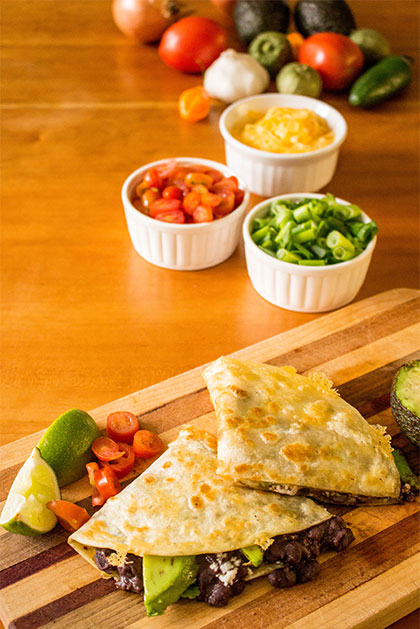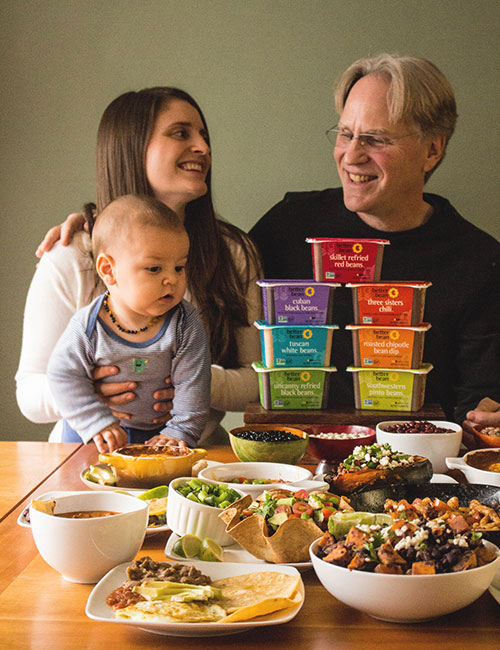
Better Beans VS Canned Beans



Better Beans |
Canned Beans |
|---|---|
| Better Beans are slow cooked fresh by hand and are found in the refrigerated section of the grocery store. | Canned beans are cooked in the can at ultra high temperature, which destroys nutrients, flavor & texture. |
| Better Beans are preserved by refrigeration, a sell by date is writing on the lid of each tub | Canned beans are last ‘forever’ – though one wonders how much nutrient value they loose every month they sit in the pantry. |
| Better Beans are easier to digest because they are fresh, soaked & also include apple cider vinegar, which further improves digestibility. When your body is able to digest a bean, it is able to absorb more nutrients. | Canned beans can be hard to digest because they don’t take the same precautions we do to soak beans fully and cook them with fresh ingredients that enhance digestion. |
| Better Beans are vegan and contain no lard. | Canned beans often contain lard or other animal products. |
| Better Beans contain 1/3 the sodium of a typical canned bean, but are much more flavorful thanks to Better Bean's unique skillet sautee process. | Canned beans contain up to 3 times the sodium of Better Beans and still don’t have as much flavor. |
| Better Beans contain 1/3 the sodium of a typical canned bean, but are much more flavorful thanks to Better Bean's unique skillet sautee process. | Most canned foods use a plastic liner inside the can that contains BPA. A few great brand, are BPA free. |
| Better Beans are packed in a BPA-Free, fully recyclable tubs. The liners of canned beans often contain BPA. | Most canned beans use commodity beans and are bland and over-processed |
| Better Beans feature sustainably grown beans from Pacific Northwest farms and other whole food ingredients like onions, tomatillos and organic peppers. | Canned beans must be rinsed, drained, and cooked before eating. And if you want them to taste good, you need to add additional ingredients. Better beans are ready to eat right from the tub. |
| All the products in the Better Bean line are Non-GMO Verified. | |
| The convenient, ready-to-eat beans are easy to pack in a lunch box or heat for a quick and nourishing family meal. |
Canned Beans: Industrial canning is not like home canning. First off, you aren’t getting your food in glass jars but plastic-lined cans. Moreover, the food in the can is actually cooked in the can rather than simply sealing in delicious pre-cooked dishes. The canned food is cooked at ultra high heat temperatures, which destroys nutrients, flavor, and texture.
Better Beans: Our beans are slow cooked by hand exactly like home cooked beans We take care that our beans retain their nutrients, flavor, and texture by using fresh, local ingredients.
 Flavor and digestibility:
Flavor and digestibility:Canned Beans: Canned beans are less flavorful than Better Beans because they’re often cooked in the can at ultra high temperatures, which destroys nutrients, flavor & texture. Because they are pressure cooked within the can, canned beans don’t have as rich a flavor as beans that are soaked and slow cooked with fresh ingredients. Canned bean varietals are chosen for their thick skin that will not breakdown in the ultra-high heat canning process, thus those varietals are harder to digest.
Better Beans: Our beans are easier to digest because they are freshly harvest beans. In fact, we only use bean from the last season. As a dry bean ages it becomes harder and harder to digest. We also soak our beans overnight because soaking unlocks all of the nutrients and health benefits of beans and helps makes them easier to digest. They also include apple cider vinegar, which further improves digestibility. When your body is able to digest a bean, it is able to absorb more nutrients. We cook our beans with fresh, locally sourced onions, tomatillos and organic peppers and our unique skillet sautee process adds rich flavor to every batch.
Canned beans: Bisphenol-A (BPA), is a chemical commonly used in hard clear plastics (water bottles) and epoxy resins (can liners). Research has shown that over time the chemical leaches into foods and water. This is dangerous because BPA is an endocrine disruptor meaning the chemical interferes with the body’s natural hormone processes. Endocrine disruptors, and BPA in particular, have been found to increase risk to cancer, heart disease and birth defects. In a study’s random sampling of 50 cans from the U.S. and Canada, researchers found BPA in 46 of the 50 food products. The liners of canned beans often contain BPA. Read my post on BPA here.
Scary fact: According to the FDA 17% of the American diet comes from canned foods yet there are no regulation or safety standards regarding the amount of BPA in canned foods
Better Beans: Our beans are BPA FREE! We pack our products in BPA-Free, fully recyclable tubs.
Canned beans: According to the FDA Sodium attracts water and a high-sodium diet draws water into the bloodstream, which increases the volume of blood and over time can increase your blood pressure. High blood pressure forces the heart to work harder and can damage blood vessels and organs – increasing your risk of heart disease, kidney disease, and stroke. Moreover industrially processed salt does not have all the same minerals as a natural sea salt or Himalayan salt.
Scary Fact: Most foods processed into cans, including beans, are significantly higher in sodium than their fresh counterparts. A 3.5-ounce serving of unsalted, boiled red kidney beans has 2 milligrams of sodium. The same amount of drained, canned red kidney beans supplies 231 milligrams of sodium!
Better Beans: Our beans contain 1/3 the sodium of a typical canned bean! But they are much more flavorful thanks to Better Bean’s unique skillet sautee process. Plus for the sodium we do use, we choose sea salt for its added mineral content!
 Preservatives & Chemical Additives:
Preservatives & Chemical Additives:Canned Beans: Some of the many additives included in processed foods are thought to have the ability to compromise the body’s structure and function and are suggested to be related to the development of skin, pulmonary and psycho-behavioral conditions. Preservatives are added to most processed foods, including canned beans. Because of this, fresh foods are really the way to go – no matter what you are eating!
Better Beans: Our beans feature sustainably grown beans from Pacific Northwest farms and other whole food ingredients like onions, tomatillos and organic peppers. The beans are slow cooked by hand then packed fresh into re-sealable containers. We use all natural ingredients and never any preservatives! Our beans taste fresher that way.
Canned beans: most conventional canned foods contain GMO ingredients from cornstarch to corn syrup to soybean or canola oil. GMOs are plants or animals that have undergone a process wherein scientists splice their genes with DNA from different species of living organisms, bacteria, or viruses to get desired traits such as resistance to disease or tolerance of pesticides – which just encourages farmer to pour more glyphosate heavy pesticides into our environment!
 Better Beans: All products in the Better Bean line are Non-GMO Verified by the Non-GMO Project!
Better Beans: All products in the Better Bean line are Non-GMO Verified by the Non-GMO Project!
The Non-GMO Project works to educate consumers and the food industry to help build awareness about GMOs and their impact on our health and food systems. One of the inherent risks of genetically modified crops and food items is that they contaminate non-GMO crops and foods through cross-pollination and/or contamination; so they also work with food manufacturers, distributors, growers, and seed suppliers to develop a standard for detection of GMOs and for the reduction of contamination risk of the non-GMO food supply with GMO’s.
Our beans are fresh packed, ready to eat, vegan, gluten free, soy free, nut free, non-GMO, low sodium, all natural, and delicious!
FOR THE LOVE OF BEANS.
Recently I read an article about how if people ate beans instead of beef that it would be enough to get the US carbon emissions down to the levels agreed upon in the Paris Accord.
I was thinking that someone should do a cooking show to show how easy it is to use beans instead of beef in their cooking and have recipes on the jars. Then I thought that if the beans you buy already packed in water had flavoring, like beef, Chipotle or Teriyaki, I see you already have some different flavors.
Comment by RK — August 10, 2017 @ 12:20 am